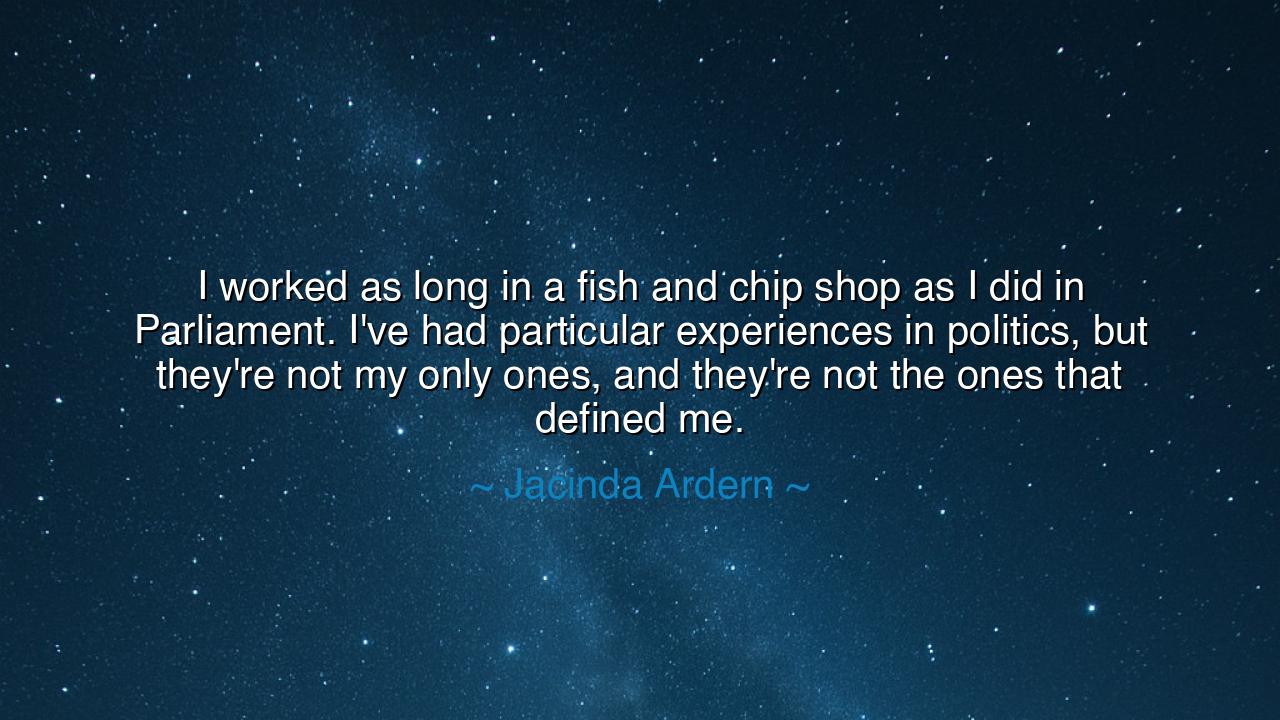
I worked as long in a fish and chip shop as I did in Parliament.
I worked as long in a fish and chip shop as I did in Parliament. I've had particular experiences in politics, but they're not my only ones, and they're not the ones that defined me.






Hearken, children of the ages, and listen to the words of Jacinda Ardern: “I worked as long in a fish and chip shop as I did in Parliament. I've had particular experiences in politics, but they're not my only ones, and they're not the ones that defined me.” In this utterance lies the eternal truth of humility, perspective, and the richness of a life well-lived. She reminds us that no single role, however exalted, contains the totality of the self; the human spirit is forged in many arenas, and its identity is shaped by the breadth of experience, not the narrow confines of a title or office.
The origin of this wisdom springs from Ardern’s life as a leader of New Zealand, a modern stateswoman who has navigated the corridors of power with grace and insight. Yet she does not let the mantle of political authority obscure her understanding of life’s ordinary labors. By recalling her years working in a humble fish and chip shop, she acknowledges the value of every experience, every humble task, as a crucible for character and empathy.
Consider the story of Abraham Lincoln, who worked as a rail-splitter and store clerk before ascending to the presidency. His early labors among ordinary men and women imparted a deep understanding of human struggle and resilience, informing his leadership during the nation’s darkest hours. Like Ardern, Lincoln recognized that the experiences outside the halls of power are no less vital to shaping the soul and guiding judgment.
Even in daily life, this teaching resonates. Those who have walked many paths—be they artisans, teachers, farmers, or laborers—carry within them a wealth of insight and humility. Titles and offices may confer authority, but it is the tapestry of lived experiences that grants true wisdom, perspective, and compassion. Ardern’s words remind us that no role, however prominent, should eclipse the fullness of the self.
History offers many echoes of this truth: Mahatma Gandhi, trained as a lawyer in England, yet deeply molded by his experiences among the oppressed in India, understood that leadership is nurtured as much in ordinary toil as in positions of influence. He exemplifies the wisdom of embracing all experiences as threads in the fabric of identity, recognizing that no single station defines the soul.
Therefore, children of future generations, heed Ardern’s counsel: honor every labor, every humble task, and every fleeting moment of life. Let not titles or office alone dictate your sense of self. In embracing the totality of experience, you cultivate empathy, wisdom, and resilience, and you come to understand that it is the richness of the journey, not the prestige of a station, that truly defines a human life.






Llu
For young readers, the message is liberating: you are more than your present job, and your path can zigzag without invalidating any piece. I want schools to teach that explicitly—career narratives that include detours, financial reality checks, and the soft skills learned outside classrooms. Could curricula pair civics with shift-based simulations—budgeting, customer conflict, teamwork under stress—to show how everyday work translates into public leadership? Closed question: if you could add one module to secondary education, would it be “Working Lives,” ethics, or practical negotiation?
KDKhanh Doan
One caution: invoking humble origins can become branding if institutions don’t change. How do we avoid romanticizing service work while still honoring its dignity? I’d love to see concrete policy spillovers—living wages for public contractors, predictable schedules, pathways from frontline roles into management, and procurement that favors employers with fair standards. Closed question: should public figures disclose how their early jobs influenced specific decisions (e.g., staffing ratios, labor protections), turning biography from anecdote into a traceable rationale we can evaluate?
NBTran nguyen binh
I hear a boundary-setting move that protects mental health and agency. When the public treats leaders as embodiments of a nation, it’s easy to forget they’re whole people with earlier and later lives. What rituals help someone step out of a high-intensity role without feeling erased—community thank-yous, sabbaticals, reflective essays, or mentoring programs? Closed question: should governments offer structured re-entry support (counseling, career coaching, security transition) to former officials, so identity isn’t welded to office and the person can carry lessons forward sustainably?
FNFarah Nguyen
There’s a media critique here that lands: coverage often reduces people to their most prominent role, then backfills a narrative to fit. How do we resist that flattening? I’d like interview formats that prioritize texture—segments on formative jobs, mistakes, and hobbies—and editorial checklists that ask, “What part of this person’s life are we ignoring?” Open question: would you support a newsroom guideline that at least 20% of a profile must address non-career dimensions, to counter the gravitational pull of a single identity?
HMDoan Thi Hong Man
I keep thinking about the skills a frontline service job teaches—heat, queues, complaints, cash flow, teamwork under pressure—and how directly those map to governing. What if public institutions treated that background as leadership training rather than a footnote? Practical idea: require senior officials to complete annual short stints shadowing service workers (kitchens, call centers, clinics) and publish reflections. Closed question: should hiring panels for public roles award explicit credit for customer-facing experience, much like they do for advanced degrees or policy fellowships?